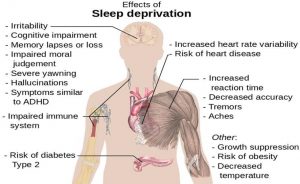Most children and young people with additional needs are at increased risk of sleep difficulties. As a result, their parent/carers and siblings don’t get enough sleep either, which causes a significant issue for families and the practitioners that support them. Current research shows that sleep is a key element of both children’s and adult’s well-being, and is just as important as having a healthy diet and getting regular exercise.
We are in the midst of a sleep-deprivation crisis… We need to rethink sleep as a core family value.
Arianna Huffington in her book ‘The Sleep Revolution’ 2016.
If sleep does not serve an absolutely vital function, then it is the biggest mistake the evolutionary process has ever made.
Sleep scientist – Allan Rechtstaffen
The study of sleep is a relatively new area of science, becoming established in the 1930s. In recent years, sleep science has really taken off, particularly here in the UK, and in the USA. Fascinating new findings about sleep are published on a regular basis by scientists and practitioners, and there are now many research studies that show the vital importance of sleep to our health and well-being.
Sleep is of the brain, by the brain and for the brain
Dream Researcher – Professor Allan Hobson
For those of us parenting or supporting children/young people with neurodevelopmental differences (e.g. Autism, ADHD, Down Syndrome and Epilepsy), research demonstrates how sleep is closely linked to brain health.
Our biological clock is controlled by our brain, primarily the hypothalamus. It does this by processing light from the retina, at the back of our eyes.

Sleep scientists are increasingly able to demonstrate that sleep is vital for a range of functions associated with our brain, including our memory, our ability to learn, and our mood.
Sleep also is closely linked to many other aspects of our physical health and emotional well-being. This diagram summarises what can happen to our health, if we are not getting enough sleep.

More Detail
Getting more sleep
Parenting Special Children’s Sleep Practitioners keep up to date with recent research and NHS guidance on the interventions most likely to be effective in improving the amount and quality of a child/young person’s sleep. A key message is that many sleep difficulties experienced by children/young people with additional needs can be addressed by parenting strategies.
These strategies are explained in our Sleep Courses and Sleep Clinics. They include changes to a family’s after-school routine, and how parents respond to a child’s behaviour at bedtime. The most appropriate sleep strategies for a child/young person are included in the Sleep Plan that is prepared for each family at the end of a Sleep course or during a Sleep Clinic.


 You can support us in various ways
You can support us in various ways